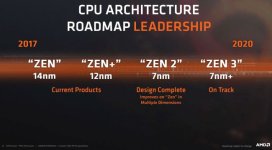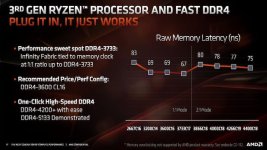Caporegime
- Joined
- 18 Oct 2002
- Posts
- 33,188
It doesn't mean they actually achieve that frequency though. With Intel defining TDPs at base frequency, if the manufacturers don't account for that in their design, it's unlikely to ever sustain any meaningful turbo. What Intel once described as "guaranteed turbo" now no longer applies. It's a d**k move, in my opinion.
Sunny Cove will have a much more powerful integrated graphics solution and better FPU capabilities, so it makes sense for clocks to fall.
Also, 10 nm is no 14 nm++++++ lol.
Well you've contradicted yourself a bunch there, the clock speeds are not guaranteed, which means they don't have to hold for heavier FPU loads and it doesn't matter if they are sustainable at that clock speed. What matters is that the make speeds they've listed for base clocks and for max boost clocks are lower on 10nm chips than those before them. This means that even in the lightest integer loads on a single core, the new chips can't hit the same clock speeds the previous 14nm+++++++ chips could. Intel have also stated quite plainly many times that the node won't clock as well as 14nm, at least at first. It was supposed to be 10nm + before they hit 14nm base speeds, and further iterations to hit 14nm+ speeds, and 14nm has been boosted in frequency several times further since then.
Faster graphics and better FPU capabilities have no direct bearing on clock speed potential at all. AVX512 has lower clock speeds, and Icelake has AVX512, but as with current chips with AVX512 capability, clock speeds are only lower when using those instructions and once again, we're not talking about guaranteed boost speeds in all loads, but a max boost speed achievable in any type of load and again, it's lower compared to the previous generation.
it only makes sense that clockspeeds fall because Intel have told everyone 10nm can't obtain the same clock speeds, it makes no sense that clock speeds would drop because they added AVX512 or a bigger igpu.





